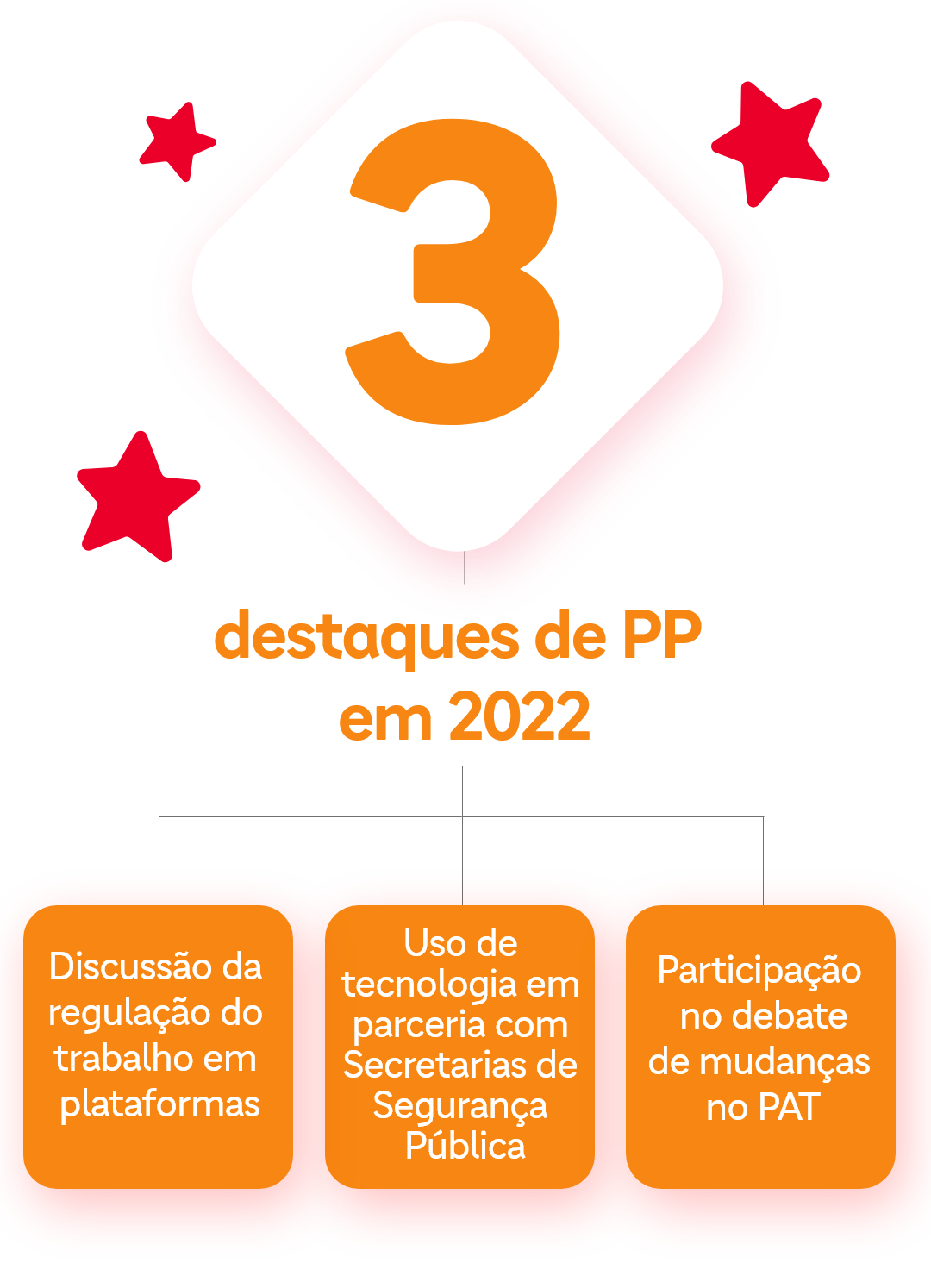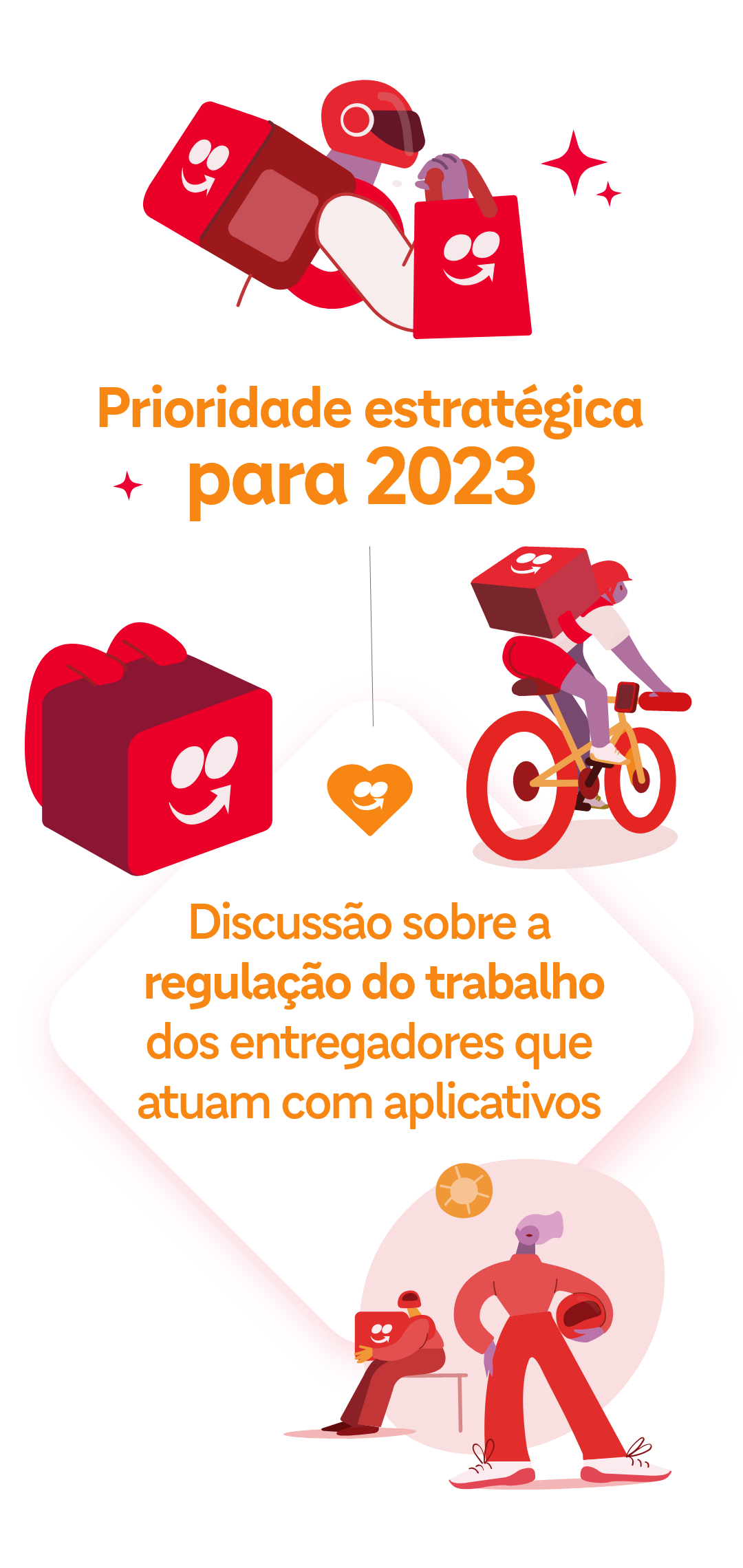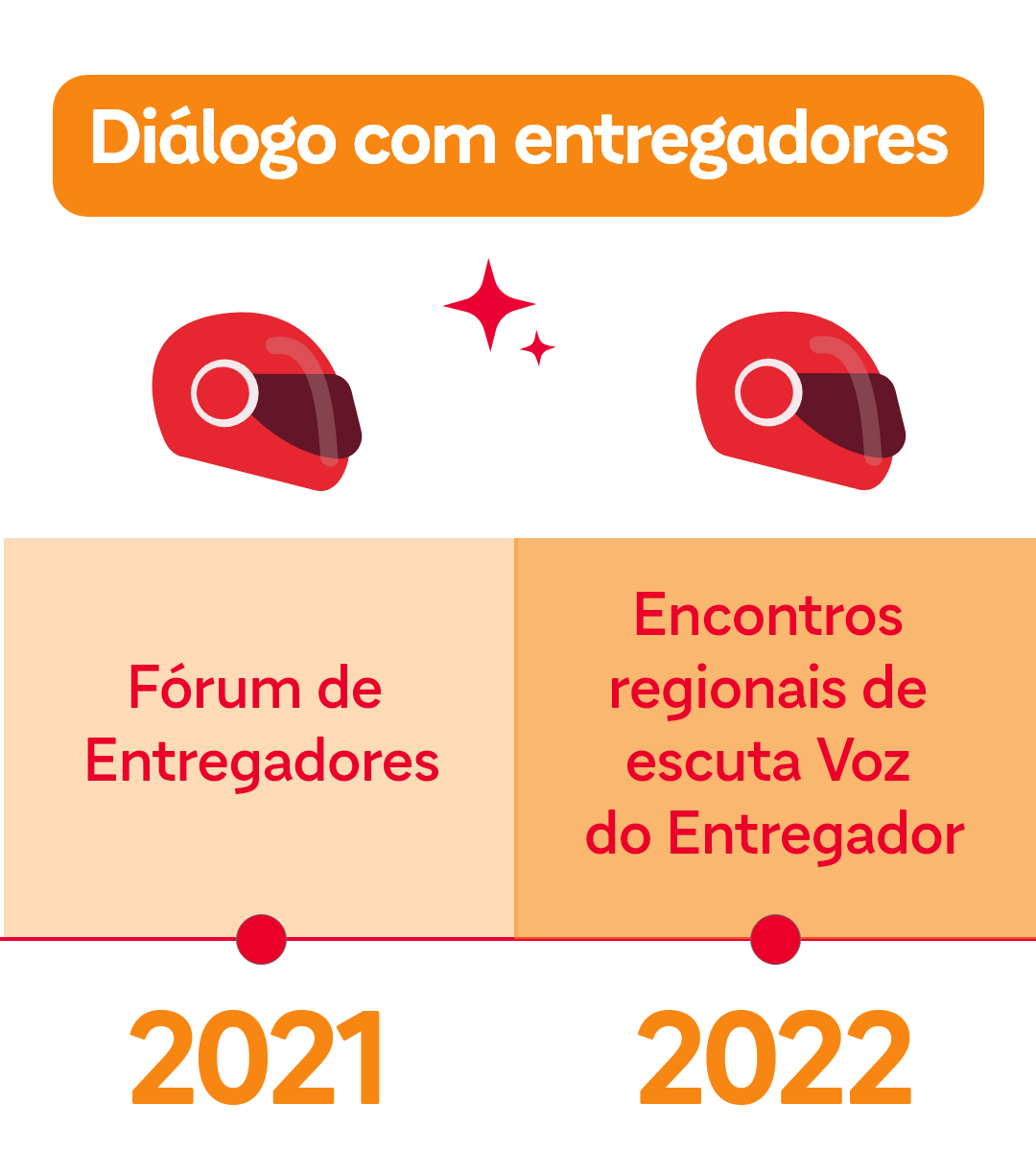The discussion about new rules for new work models has been one of the pillars of iFood's public policy area since it was created in 2019. Almost four years later, after much dialogue with delivery people regarding labor regulation, the time has come to put proposals on the table and build together with the government and workers.
“Our focus this year will be on regulating the work of app delivery people”, explains João Sabino, director of public policies at iFood. “If we actively participate in the development of an innovative regulatory framework, where delivery drivers, the business environment and society win, we will have achieved our big dream.”
In an interview with iFood News, João explains why it is important for the company to participate in the construction of public policies like this — or collaborate with Public Security Secretariats against criminals pretending to be delivery people and participate in the discussion of changes to PAT (Worker Food Program).
“Although it is a technology company, iFood has an impact on the real lives of people and cities. Our operation moves almost 0.5% of GDP of the country, according to data from Fipe. So it is our responsibility to look for solutions”, he says. “Today, society and the market do not accept that a company operates only in a legally legal manner. It is necessary to have legitimacy, for society to recognize that the company cares about environmental and social issues.”
Read below the full interview with João about the prospects for the public policy area in 2023 and his main areas of focus.
iFN – In 2022, what were the most important themes for iFood’s public policy area?
John - A long-term project that gained traction in 2022 and will gain even more in 2023 is regulation of work in applications. It is a subject that is inserted in a global context of new work settings.
Work mediated by applications currently has a considerable percentage of the market. Technology has allowed workers to have the autonomy to carry out different activities, even concomitantly, and flexibility to move between these different jobs.
This implies the need for different regulation. The activity regulation model is no longer suitable for this new reality. Here at iFood we don't evaluate whether the CLT [Consolidation of Labor Laws] is good or bad. We are convinced that it is not used to regulate work by application.

We hear this conviction from the workers themselves. In a series of research carried out over the last three years, they point out: 2 out of 3 application workers don't want the CLT model.
For iFood, this is just the beginning of the discussion. Even though traditional legislation is not compatible with new business models, we believe that there is a need for different regulation, which encompasses these new characteristics of work.
We understand, for example, that some rights and benefits existing in the formal system of social Security need to be guaranteed to delivery people through specific regulations.
iFN – In 2023, what will be iFood’s priority in public policies?
John - Our main focus this year will be the discussion of regulating the work of delivery drivers. The new government spoke about this topic in the campaign, from the beginning it has publicly signaled that it will devote attention to this issue and has already kicked off the discussion.
This agenda must move with priority and speed this year. It is a priority for the government, and iFood is prepared to participate. We have been studying the topic for more than three years, participating in debates, involving our ecosystem to sit at the negotiating table and present our views on what would be the best public regulatory policy for working through applications.

iFN – What would be the important points of this new regulation?
John - This is a response that will need to be constructed together with workers, the government and the sector. From now on, it seems to us that the first premise is that the CLT model is not suitable for either party. On the other hand, another very important principle is that there must be pension inclusion of these workers and the provision of basic rights.
iFood already grants a series of advantages to delivery people, but there needs to be regulation so that this is an obligation for all companies. That's why we are in favor of regulation.
It is also important to remember that we only represent a portion of the app delivery market. There is a much larger range of deliveries made by the restaurants themselves and a universe of deliveries of other types of products that are not food. And there are app drivers and a series of self-employed professionals who must be covered by regulation.
iFN – How has iFood’s dialogue been with delivery drivers on this topic?
John - Our public policy team was created in 2019 precisely to prepare for this debate, making dialogue with new leaders of delivery people. When you start to discuss new forms of work and regulation, you need to have representation. And this is a construction that is the responsibility of the workers themselves.
Traditional representation, through unions and associations, plays an important role, but it no longer seems to make sense for some of these new professionals, who come together and organize themselves in different ways. Today we find these leaders on WhatsApp, YouTube, and social media.
Since 2020, we have been out in the field, traveling around Brazil to identify leaders and create a relationship with them. This culminated in National Delivery Drivers Forum, in December 2021, in which we brought together 23 leaders from 14 cities in the country.
We took away many positive points from this event. The most immediate were improvements to the iFood operation and product. We heard what the delivery drivers' main pain points were in relation to the application, and all of this has been improved since then.
The National Forum was derived into permanent regional forums in 2022, such as the Delivery Man's Voice, which brought together more than 600 delivery men and women, in 20 cities. And our organization began there with these leaders to debate regulation, to understand what would be interesting for them. This regulation must focus on delivery people.
As we are a Brazilian company and market leader, we have a responsibility to our business, to the ecosystem of customers, delivery people and restaurants and to society.
iFood is immersed in the internal politics of social license to operate, or social license to operate. Today, society and the market do not accept that a company operates only in a legally legal manner. It is necessary to have legitimacy, so that society recognizes that the company is a citizen and cares about environmental and social issues.

iFN – Was it this reasoning that led the company to form partnerships with Public Security Departments to help the police identify criminals posing as delivery drivers?
John - This is a great example. At the beginning of 2022, a new type of crime emerged in which criminals posing as delivery men began to rob people. The police arrested several of them and it was soon realized that they were not iFood delivery people.
Even though this is a public safety problem, this is connected to the responsibility that iFood has towards society. So we collaborated with law enforcement authorities and opened a dialogue to create mechanisms that would prevent these crimes.
Our solution, which was accepted by the Governor of the State of São Paulo, was solve this problemOproblem with technology. We built and licensed an API to the government, which is basically cloud software where the bases of iFood and the Secretariat intersect, but neither party has access to the other's individual data.
With this API, the police identify in real time whether the suspect is a delivery person registered on the iFood platform, whether he delivered in the previous days and whether he is on a delivery route. With positive answers to these three questions, we eliminate 99% from initial suspicion, and police work becomes more assertive.
This technology was a success, and we were approached by several Public Security Secretariats, such as those in the States of Ceará, Rio de Janeiro, and the Federal District. Then We have extended access to this API to several other states aiming to help reduce this problem.
Now we want to expand this initiative and discover new ways to collaborate with governments to solve other problems using technology.
iFN – iFood was also involved in the PAT changes. What was this process like?
John - This was a major delivery from iFood's public policy team in 2022. PAT is a market that generates R$ 150 billion per year and was closed to a few companies for more than 30 years.
This was due to a regulatory distortion that allowed these companies to occupy the market, preventing competition from entering and still charging high fees to restaurants. And the service wasn't even connected to applications, there was only a physical card.
So we participated in study groups and did intergovernmental relations work to make the government aware of this distortion. After a broad public consultation, the government changed this regulation prohibiting practices such as rebates and instituting mechanisms such as portability and open arrangements, for people to pay at any machine.
PAT is focused on workers. With these changes, prices have already been falling, and with portability they can choose the brand of food and meal vouchers they want, no longer the one that employers determine.
This was a great victory for workers, the restaurant market and the ecosystem, because iFood and other companies can compete on equal terms in this market.
The main rules, such as portability, come into force in May. But there is still a need for specific regulations, and we are participating in discussions at the Ministry of Labor to define these rules.


